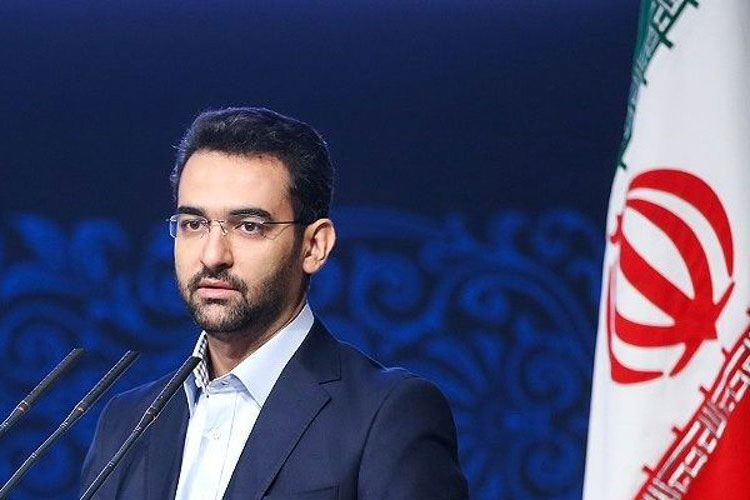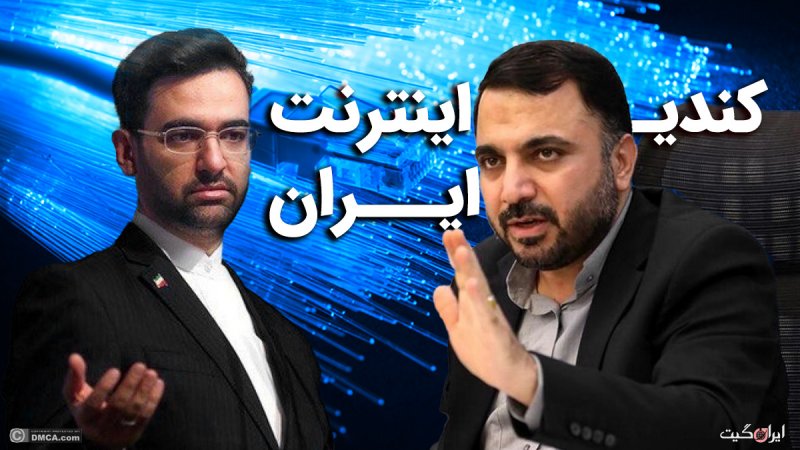Iran’s Internet Slowdown: Whose Foot is on Iran’s Internet Cable?
The slowdown of Iran’s internet is a report on the state of Iran’s internet. In recent years, whenever internet speed in Iran faced issues, a humorous saying would circulate among the people: ‘So-and-so, take your foot off the cable.’ Usually, the target of this phrase was the Minister of Communications. However, this slowdown has become significant under President Raisi’s government, to the extent that Azari Jahromi, the Minister of Communications during Rouhani’s administration, has blamed the current government for the internet slowdown. In a detailed interview he recently gave to the Sekkeh podcast, he extensively discussed the anti-cyberspace policies of certain factions and their pressure on the government aimed at reducing public access to the internet.
Although the current minister, Isa Zarepour’s response to the complaints is that if there is a slowdown, they can call system 195 and report it, and we will certainly investigate it, or that the speed and slowness of the internet should have criteria.
It might be that in our home the speed is high, while at your workplace it is low, or vice versa. According to global rankings, we have advanced six ranks in mobile internet, and in speed, we were 21 and are now 25. There might be disruptions in mobile internet in some places.
Meanwhile, Azari Jahromi, in his recent interview with the Sekkeh podcast, stated that the average internet speed in Iran per Iranian is 15.2 kilobytes, while the average speed in Argentina is 4113. When asked for the reason, he said the reason is filtering. He mentioned that the main hostility of some towards the internet in Iran is its media function. In the same interview with the Sekkeh podcast, Azari Jahromi said some people claimed 3G was forbidden and even obtained a religious decree against it.
Moving Quietly Towards the Protection Plan
In the past year, Iran’s internet slowdown is miles away from the promises that Ebrahim Raisi, the head of the thirteenth government, made as one of his electoral slogans before taking office. Now, every day the internet is slow for various reasons, and sometimes it is cut off for strange and unbelievable reasons. Raisi is nowhere to be seen to hold the Minister of Communications accountable for these outages and slowdowns, and it seems the parliament agrees with this matter as they don’t even summon Isa Zarepour, the Minister of Communications, to the parliament for accountability.
Meanwhile, many believe that the outages and slowdowns of the internet over the past year are actually the government’s subtle and creeping move towards implementing the Protection Plan for cyberspace, which has brought numerous controversies. However, instead of speaking transparently, the Minister of Communications has preferred to evade the truth by making strange excuses.
Telecommunications at the Command of the Sovereign Shareholder
One of the actions that took place during Azari Jahromi’s time to increase public access to the internet was the discussion of breaking monopolies, something he says happened in the mobile internet network but not in home internet because it is under the control of the Telecommunications Company, which has been privatized, and its main shareholder is a governmental entity. He says there was a time when we didn’t have rates higher than 128 kilobytes, and ordinary people didn’t have access to higher-speed internet. Students could use 512 internet with a student card, while in the world, gigabyte internet was offered here at 128 with exorbitant prices.

Azari Jahromi’s Complaint Against Telecommunications
The former Minister of Communications explains further that Telecommunications does not want to break its monopoly in the home internet sector and give access to the private sector. He says if I do this, national security will be at risk. I say, what does national security have to do with you? I am the government, I am the authority, but Telecommunications says my shareholder is more authoritative than you.
Azari Jahromi says that based on this, I filed a complaint against the privatization of Telecommunications, and a case has been opened in the judiciary in this regard. He adds that by gathering evidence, a bill was drafted to amend the law on the privatization of Telecommunications and was submitted to the parliament at the end of the previous government, but now I hear that the current government has withdrawn and halted the bill.
Towards Breaking Monopolies
Azari Jahromi says what we did was remove this tariff. In 2015, we removed the tariff and made the market competitive. The gentlemen before us were conservative, saying since there were approvals that we could give people internet higher than 128 kilobytes and 256 kilobytes, we removed this. We put a tariff on the connection but made the usage competitive.
He recently reacted to the recent statements of the government about the state of the internet, saying for us, it is enough that we changed the notion that 128 kilobits per second internet was sufficient for the people of Iran, or that the development of third and fourth-generation mobile phones was considered against sacred law, or that bringing the internet to villages was considered implementing the 2030 agenda, to the slogan of multi-megabyte internet for homes.
Political Decision of the Think Tank to Reduce Consumption
The former Minister of Telecommunications says in 2020, overnight in a think tank, they decided to create restrictions on the internet by raising tariffs. Others decided for the two major market operators to raise prices, a decision that was not at all economic but political. I also dealt with it economically, saying you have no right.
Their mechanism was to remove popular packages. I complained to the regulatory body, and they said violating your regulations has a two-billion-toman fine. We will pay this fine. We also decreed to fine them ten percent of their revenue. After this fine, they pulled back a political decision to push people towards reducing consumption.
DMCA Cover

